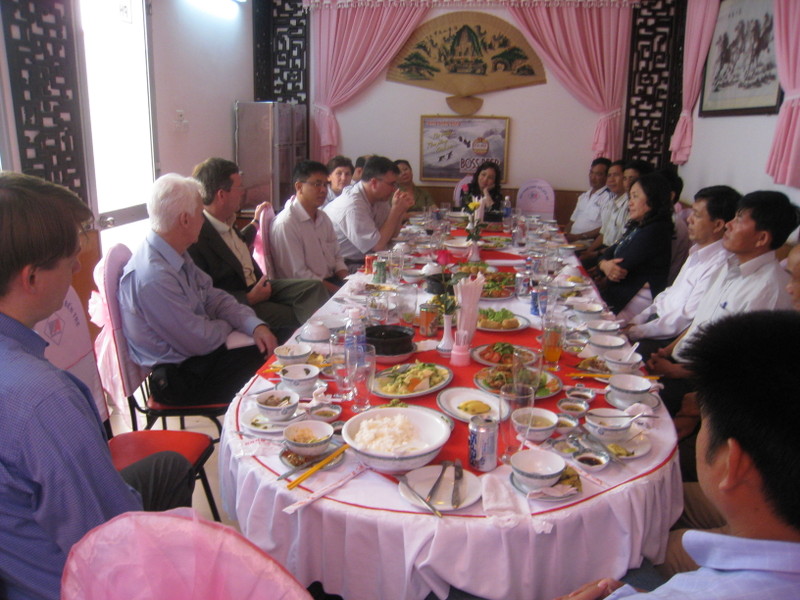Viet Nam – Blog III
Following on yesterday’s blog, here are some additional observations about my recent trip to Viet Nam.
Observation two: While they maintain a communist structure of government, Viet Nam is obviously devoted to being part of the global market economy. As people vote with their dollars, markets are highly democratic. It seems clear they have found a way to reconcile the ideology. They have attained status in the World Trade Organization and seem highly motivated to come into conformance on global economic standards.
When I visited with a group of shrimp farmers, we discussed market conditions, world prices and the demands of entrepreneurship. Clearly, the government plays a different role in their business than it does in a democracy. These were small businessmen, looking to find niches in a market where they could optimize their opportunity.

Observation Three: The Vietnamese government seems to understand the importance of protecting the made in Viet Nam brand. They are proud of the fact that it is beginning to show up more places. We discussed openly how quickly a brand that is not known well can be damaged by adverse quality events. We agreed during our talks to develop a working group to develop MOUs, similar to what we have done with China, which will allow our regulatory agencies to work interoperability, even though we have different systems of government.
Viet Nam is drafting new framework laws for food and drug safety so this is an opportune time to work with them. We agreed to move on aggressive time frames.
Observation Four: The business environment has a frontier quality to it. There appears to be opportunity everywhere, but you would have to have a high tolerance for the type of bureaucratic and political uniqueness that accompanies a country in transition. I had lunch with members of the American Chamber of Commerce. I sat next to Tony Foster, a Chicago based businessman who is building several businesses in Viet Nam. He is actually married to a Vietnamese physician who now lives in Chicago.
One of his businesses is a company providing international telephone services, and from his short description, he appears to have taken advantage of a need Viet Nam had for telephone capacity. As part of his willingness to invest in telephone infrastructure, his company was granted status that, for a time, gave him a comparative advantage in the market.
At the Port of Saigon, the Port executive told me they had contracted with a Seattle company to build a new Port. I know little about it, but presumably the company will invest money and bring expertise, earning a return from Port fees and securing an early position in a growing enterprise. I observed a similar arrangement in southern India.
As we boarded the plane to Ho Chi Min City, our Ambassador, Michael Michalak, introduced me to a private equity fund manager specializing in Viet Nam investments who was also boarding. There are obviously unique challenges investing right now, but with a populations growing rapidly in number and prosperity, Viet Nam is an intriguing marketplace.
Viet Nam still has state control of most of the key industry groups, and they have been slow to give up control. State owned enterprises make up 37% of their GDP. The government owns and controls industries like banking, energy, air travel, and health care.
Observation Five: Reduction of poverty is a primary social goal of the government and they seem to be succeeding to some extent. In 1993 58 percent of the nation’s population was in poverty. Today it is only 15 percent.
They will have to do substantially better in basic areas like education, health care system, etc. However, they seem to know where the problems are.
The Vietnamese government has a goal to be a country with middle income. They also aspire to be considered an industrialized country by 2020. It feels like, to me, that the Vietnamese and Chinese have similar approaches to planning. They also have the ability to compel things done that democracies require more time to finesse.
Observation six: Personal freedom is still mixed. Freedom of religion has dramatically improved the past few years and the churches are full.
However, freedom of speech is not as good. The embassy told me there are many situations in recent years where people have been imprisoned for speaking out against the government.

Good to see progress being made by their government. This is something that must be eradicated, or at least controlled.
Posted by: Dr Russ Hancock | May 14, 2008 at 09:30 PMI think any country in the world has the right to be part of the global market and I'm glad to see Vietnam getting this recognition.
Martin
Posted by: Martin Parry | June 05, 2008 at 11:59 AM